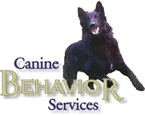Your Weekly Training Tip
Feb 21, 2010
The word "good" is taken very much for granted. It is such a critical part of your dog's vocabulary - after all, it's the way you let her know she's right! However, in my experience, too many dog owners never actually teach their dog that the word "good" has any consistent, significant meaning. Keep in mind that dogs are not born knowing any words; they learn by association. Are you getting the most out of "good" with your dog?
A Dog Trainer's Definition of "Good": Good means that your dog is doing something you like. It means you are pleased with her. It means you enjoy or value her behavior at that moment, that you appreciate her effort, and/or that you are letting her know that she's on the right track.
How To Say It: The word good, like all praise, should be said sincerely. You don't need to mimic the way anyone else says it - your dog will tell you if it's right or not. Do your dog's eyes shine when you say "good"? Does her tail wag? Do her ears perk up as you say the word? If yes, then that's all you need to know! If no, then experiment with your tone and demeanor as you say it, until your dog tells you "that's it!" Try to avoid saying "good" in such a way that it comes out sounding flat and boring, or nervous, or sounding uncertain and question-like. Good should sound, well, good!
When To Say It: Your praise word should be given as your dog is doing the behavior you are praising, not after she is done. To use "stay" as an example, if you only praise the finish of the stay, your dog will assume that's the part of the behavior you liked. She will hold her stays for shorter and shorter periods of time, in order to get to the part that you obviously appreciate. Remember, praise during the behavior, not after.
How To Strengthen It: By pairing your praise word with other things your dog finds rewarding, you can actually strengthen the positive meaning of "good". To do this, say your praise word ("Good!"), pause one half second, then follow with your reward - a treat, a toss of the toy, a favorite game - whatever your own dog truly enjoys. When you do this, your dog will come to associate the sound of the word "good" with other happy, enjoyable things, making your praise that much more meaningful to her!
Multiple meanings. A common misuse of "good" is to give it multiple meanings, such as also using it to mean "that's it - you're done!". For instance, let's look at stay again. You ask your dog to sit and stay. After a few seconds, and a lovely job on your dog's part, you praise "good dog!", and your dog jumps up happily from her stay. So what could be wrong with that? Well, teaching your dog that "good" means "you're done" means that you will never be able to praise good behavior that you want your dog to maintain. As a dog trainer and owner, I want to be able to tell my dogs "good" during their stays, and while they are coming, and as they are giving me attention - because I want for my dog to keep doing those things until I tell them otherwise. This is why trainers teach the use of a separate release word (such as "okay!") to mean that your dog is done with what you asked her to do.
No Dilution Necessary. Try to avoid diluting the word "good" by using it when it doesn't really mean anything. All of us do it - we find ourselves saying "what a good girl" to our dog for walking into the room, sleeping cutely, basically for living, breathing, and being adorable! Now, don't get me wrong - I'm not suggesting you ignore your dog or love her any less. But, try to train yourself to use words other than your main praise word when you are not actually praising a behavior.
Thanks - and until next week, enjoy your dogs, and Happy Training!
Julie
Julie Cantrell BSc, CPDT-KA, CDBC
Canine Behavior Services
www.k9behaviorservices.com
Free Dog Training & Behavior Tips If you enjoy our training tips, sign up here to get them in your inbox! With each issue, you'll understand your dog better, and enjoy training more! |
Weekly Training Tips are
Copyright 2010, Julie Cantrell BSc, CPDT-KA, CDBC, Canine Behavior Services. All rights reserved.
www.k9behaviorservices.com
www.k9behaviorservices.com

